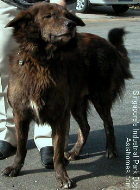"You wrote a composition on 'Loss'
in your English Language preliminary examination?" I asked Nurse Ann's son who would
be taking his "O" level examinations in six weeks. If he could get less than 20
points in his subjects during this preliminary examinations, he would qualify to study in
the junior colleges. The less points, the better his chances were of going to the top
junior colleges. If not, he would have to sit out three months waiting for the results of
the "O" levels and the four points he had for extra curricular activities to
give him an edge by reducing the 20 points by 4 would be of no advantage to him.
"This is a very tricky topic as it is too generalised and you can't score high marks
unless you have read widely and are able to link topics on loss," I said. I knew he
did not bother to read the Straits Times Newspaper to be more aware of current affairs and
be knowledgeable or visit the National Library even once a week, as he had better things
to do, like computer gaming and watching television or going out with friends. All these
activities cut off the time for research and self study. So, it was a foregone conclusion
that he would not have a powerful command of the English Language.
"It was the only topic of the four I could write about. I wrote more than 600
words. It was an exposition essay requiring 350 - 600 words. The other topics were
public ban of smoking, advices I had received, how to fit in a group and sights and sounds
of a school event.
"What did you write?"
"I wrote about relationships," the boy pointed to the examination paper where he had
scribbled the outline of his essay. The outline was less than 20 words.
Three examples on loss of friendship and love were scribbled. This
was insufficient content in an essay. I felt an instant
sadness as I knew that this boy could excel in his studies but he did not know how.
His
mum believed in not hovering around him like a hawk, ensuring that he studied the hours
and go for tuition, unlike other Singaporean mothers. It was too late now. His academic
foundation was wobbly judging from numerous red marks in his examinations in the past four
years of secondary school. Somehow, below par performances in examinations did not bother
this boy as he believed he would do well at the "O" level examinations and
qualify for studies a
junior college. It was youthful optimism untainted by the too many
failures and disappointments of adulthood.
"How many marks did you get out of 40 maximum?" I asked this strappy
sixteen-year-old boy whose face had been burnt chocolate brown by the four years of
National Cadet Corps marching under the hot tropical sun. He was one head taller than
Nurse Ann and looked more like his mother.
"I had 23 marks," the boy whispered as he knew I had always expected him to
perform well academically since he was in primary school.
"That would be 58% and would be not good enough to help you qualify for the top ten
junior colleges," I said. English Language was a core qualifying subject and every
mark counted in this preliminary examination. Students who had excellent results
from 5 subjects including English Language would get enrolled into the
junior colleges earlier by three months while the others would have
to wait and if they are disqualify, there was the polytechnics or
institutes of education.
"It is difficult to write a high quality essay on 'Loss' unless you read
widely," I said. "Many junior college students would not
be able to score well in this topic too, unless they had read widely
and are able to elaborate more on 'Loss' generally and link them
politically, socially and economically. Many of such topics
require that you give a variety of illustrations rather than just
personal loss of friendships."
Why did the teacher give a question on
"Loss"? Could it be related to some significant events
recently?
Events such as the September 11 2001 loss of lives, properties and share values. This
would be world affairs. The
corporate corruption of Enron causing loss of confidence in shareholders who now don't buy
much shares leading to loss of capital for companies would be
economics. So would the US$30 billion loan from
the International Monetary Fund and the World Bank to help the Brazilian economy from a country going bankrupt,
leading to loss of jobs.
In Singapore, the loss of a life to liver failure of a
Singaporean woman who took Slim 10 dieting pills would had social
consequences. Pet loss of newly purchased puppies due
to viral diseases are very traumatic to the new owner who loses
money as well as suffer grief.
Most Secondary Four boys will be caught at a loss of words when given essay questions
to write as they don't read widely and hence cannot link events to
"Loss".
They don't like to read the essays in the newspapers and hence do not have a powerful
vocabulary to tackle essay questions well. They love tabloids,
Archie comics, television and computer gaming. The majority of
teenagers do not go to the Library.
The school teachers in Singapore are kept busy with high numbers of pupils taught per
student and had to teach more than one subject and do administrative and extra curricular
activities. Some of them get hoarse voices and had to go for voice training after
five years of teaching.
It would be an unusual teacher who had the high energy to teach the boys from bottom
classes good English as such boys are really not interested in studies. Nurse Ann's son
was in the bottom class because he had chosen a biology subject which was only taught in
this class. Nurse Ann did not comment much. She was a believer in positive reinforcements.
No discouraging remarks. No brutal frankness as this will
de-motivate the
boy.
 The telephone's ringing interrupted my thoughts on "Loss". Mr Tan, an
industrialist, said, "Do you remember me? I have to export my dog to Myanmar as I
can't keep him in Singapore. Can you issue a veterinary health certificate?"
The telephone's ringing interrupted my thoughts on "Loss". Mr Tan, an
industrialist, said, "Do you remember me? I have to export my dog to Myanmar as I
can't keep him in Singapore. Can you issue a veterinary health certificate?"
I could not remember Mr Tan. There are
many Singaporeans with the surname of Tan. "Well," Mr Tan said, "Do
you remember the dog whose two balls popped out of his scrotal bag, after a vehicle
accident and you castrated him?"
I could remember this uncommon case. It was at least two years ago. A skinny
cross-bred was all I could recall.
"Please bring your dog to the surgery for the health examination," I said.
Mr Tan wanted a
certificate without the need of an examination because the dog would attack people.
It was a strong dog and was hard to control in the car. "It will save you time
and I will still pay your professional fees," he said. "You had seen the dog
before."
Certifying an animal for health without inspection is a loss of professional integrity for
a veterinarian. There would be such requests for many veterinarians.
"I need a dog licence but it is difficult to apply for one," Mr Tan
continued. He was fluent in the Cantonese dialect but he was knowledgeable about the
rules and regulations. His dog was over 40 cm at the shoulder height and over 10 kg
in weight and would not be permitted to be kept in his (Housing & Development Board)
HDB apartment. The HDB industrial park operator also prohibited the keeping of dogs by
tenants. Therefore, he was in a fix even though he wanted to export this fearless
dog.
 This dog was intelligent. He would be the sentry to watch out for the dog catchers
while the others would nap under the container. Once he saw the blue cranky
Land rover
moving in, he would warn his mates and they would disappear. For the past three years, he
had evaded capture. I was glad that he would be exported as capture of a stray dog meant
death for him. This dog was intelligent. He would be the sentry to watch out for the dog catchers
while the others would nap under the container. Once he saw the blue cranky
Land rover
moving in, he would warn his mates and they would disappear. For the past three years, he
had evaded capture. I was glad that he would be exported as capture of a stray dog meant
death for him.
I told Mr Tan that I would apply the dog licence for him as it
could be done electronically. The cost of a new licence for a male dog was $20.50. He gave
me fifty dollars. It seemed like easy money. Just click on the
mouse and email the form. The licence would be posted to Mr
Tan.
It was not simple to apply electronically. There was a need to download the Acrobat
software so as to read the form electronically.
Then, the form had to be downloaded and printed
out. If I wanted to pay electronically, I had to get the form
approved by the licensing authority first. Then I had to download a
software called e-wallet and register myself. This was to avoid
fraud. To pay, I must buy a cash card reader machine which
could read my cash card. That would set me back by one hundred
dollars if such cash card reader machine is still available for
sale.
How about payment by credit card as in amazon.com
when you buy a book? It was not possible to pay by credit card
directly.
The whole application journey was unbelievably tortuous.
In the end, it was easier to ask Nurse Ann to take a taxi to
get the licence directly.
I had to make a house-call without charging Mr Tan, to make sure
that there was a real dog before getting the licence. This
whole process was a money-losing proposition.
At the industrial park factory, the dog, kept in Mr Tan's office,
leapt straight onto me, ready to attack. Mr Tan had forewarned me
and I was ready.
The dog was in excellent health and had no problems with his operation. I asked Mr Tan to
lift up his tail so that I could check that he was castrated.
I could remember the unique accident case but not the identity of
this dominant dog.
 I did
not ask Mr Tan, but I guess he would be fined $500 if he was found with an unlicensed dog
and in any case, the industrial park operator would penalise him for breach of tenancy
agreement and evict him. I did
not ask Mr Tan, but I guess he would be fined $500 if he was found with an unlicensed dog
and in any case, the industrial park operator would penalise him for breach of tenancy
agreement and evict him.
Mr Tan loses a good dog but I am glad that this sentry will have a safer life
in a nice house in Myanmar without having to be on guard for his
life as the dog catchers intensify their rounds each time a
Singaporean complains about stray dogs.
Fortunately shot guns are now no longer used in Singapore after a
man sleeping amongst stray dogs was shot and died. Singapore loses
top talents to other countries as the world globalisation provides
more opportunities for emigration. Losing a top dog
owing to bureaucratic obstacles and penalties would be of concern
only to the industrialist who loved dogs.
P.S.
A brief history of dog shooting in Singapore
Humane treatment of stray dogs and dog shooting in Singapore |
 TOA
PAYOH VETS
TOA
PAYOH VETS TOA
PAYOH VETS
TOA
PAYOH VETS